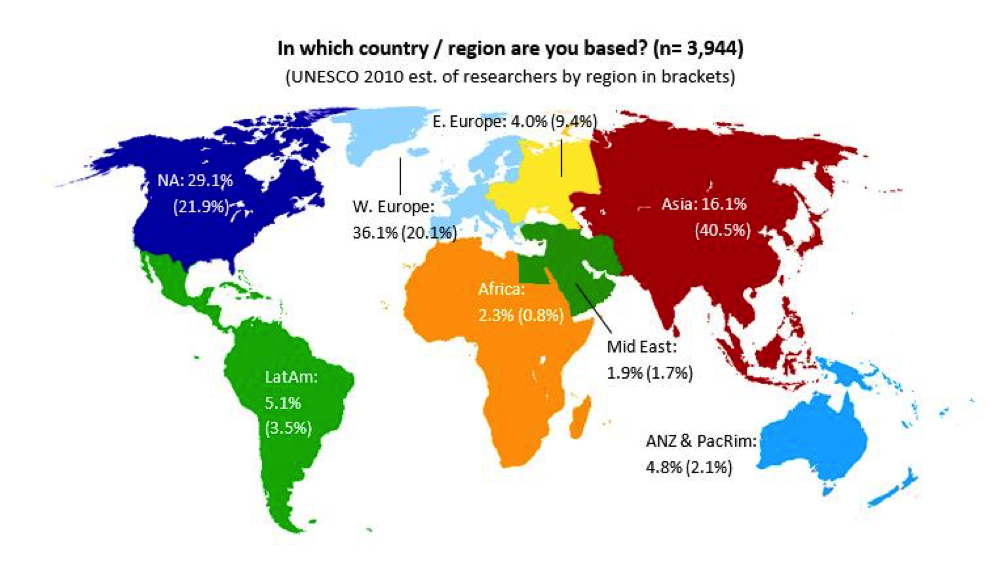What is the level of awareness of ORCID in the research community, and how positively is ORCID viewed? What does the community see as the most important benefits of ORCID? How much support is there in the research community for ORCID mandates? How do perceptions of ORCID vary across the research community – by discipline, region, and sector?
Answers to all these questions, and more, can be found in the full report (DOI: 10.6084/m9.figshare.2008206) from our recent survey, now available along with the anonymized data (DOI: 10.6084/m9.figshare.2007522).
In our previous post we noted the great response to the survey – close to 6,000 respondents, with a completion rate of nearly two thirds. Nearly nine out of ten respondents work in research institutions, and researchers (65%) were the single biggest group represented. Half of respondents came through a survey link embedded in the ORCID registry, and another third came through a link in an American Geophysical Union member newsletter. Physical sciences researchers were 41% of respondents, life and medical sciences were 29%, and social sciences and humanities were 14%. From a regional perspective, we received responses from all parts of the world, largely in line with usage of the ORCID registry.

First, some of the good news – and there’s plenty of it!
Perceptions of ORCID in the community are largely positive and there is strong support for ORCID mandates
- 69% of respondents agree or strongly agree that it is easy to sign up for an ORCID iD, and 49% view ORCID iDs as essential for researchers. Among those respondents who had not registered for an ID, the largest agreement was with statements that “ORCID helps advance my career” and “ORCID is essential for researchers”
- Respondents were most likely to view ORCID as (in descending order) open, new, approachable, efficient, easy to work with; and least likely to describe us as unnecessary, hard to work with, a no-brainer, awkward, and complicated
- A clear majority of respondents (72%) agreed that mandates would benefit the research community; 21% were neutral on this point, and only 7% disagreed. Three-quarters of respondents were supportive of publishers requiring the use of ORCID iDs in the manuscript submission process. Around two thirds of respondents were supportive of mandates by their institution, research funders, and professional associations
Integrations in common researcher workflows are working
- Colleagues (in various roles) were listed by a third of respondents as how they learned about ORCID, and a similar proportion learned about ORCID through a publisher. Respondents were much less likely to learn about ORCID via funders (3%) and professional organizations (5%)
- Over half of the registrants who responded have used their iD when submitting manuscripts and 43% remembered being prompted to do so when they last submitted a manuscript
- ORCID iDs in institutional and funder workflows are also key, with 26% and 13% of respondents respectively using their iDs in this way
- Of the respondents whose organizations have integrated ORCID, two thirds agreed that their organization will benefit from a community approach, improved data quality, and workflow efficiencies
We also have some things to work on, and there are clear leverage points.
Increasing awareness and understanding of ORCID remains an important goal
- The two most recognized messages about ORCID as an organization are that the service offered is free for researchers and that ORCID is a not-for-profit. However, when asked about their knowledge of ORCID iDs, over 40% reported that they were unfamiliar with ORCID iDs
- Awareness is uneven by discipline, but not by a huge amount, varying from 64% in life sciences to 54% in the humanities
- Awareness of ORCID’s key messages, and of ORCID iDs, is similar among librarians and publishers, and about 25% points higher for both groups than overall. This suggests some key focus points for researcher engagement
- Awareness and understanding also varies by region. For example, respondents in the Middle East were twice as likely to have heard about ORCID through a publisher. In Australasia, more respondents were familiar with ORCID iDs and were twice as likely to have heard about ORCID from their institution. And in Europe, respondents were four times as likely to report that their colleagues had an iD
- Different benefits resonate with different communities – for example, respondents in Africa, Latin America, and Asia were about 10% more likely to be concerned about mistaken attribution than those in other regions
We must continue to improve and communicate ways for researchers to connect information to their ORCID iD
- Two thirds of respondents were aware that ORCID iDs could be connected with affiliations and a variety of research contributions, but only about half had actually used their iD in a research workflow; of these most had used their iD in journal publication workflows
- Key messages include improving ease of use and reducing data entry burden
- Our commitment to record-holder privacy and personal control of ORCID records is an important secondary message
The survey has given us plenty of food for thought, as well as direction for our 2016 communications efforts. It also provides a foundation for ongoing measurement of community understanding and engagement.
The report and data are freely available under a CC-BY license for anyone who’d like to take a deeper dive into the results. We welcome your feedback and comments – on twitter (#ORCID_Org) or by email.
